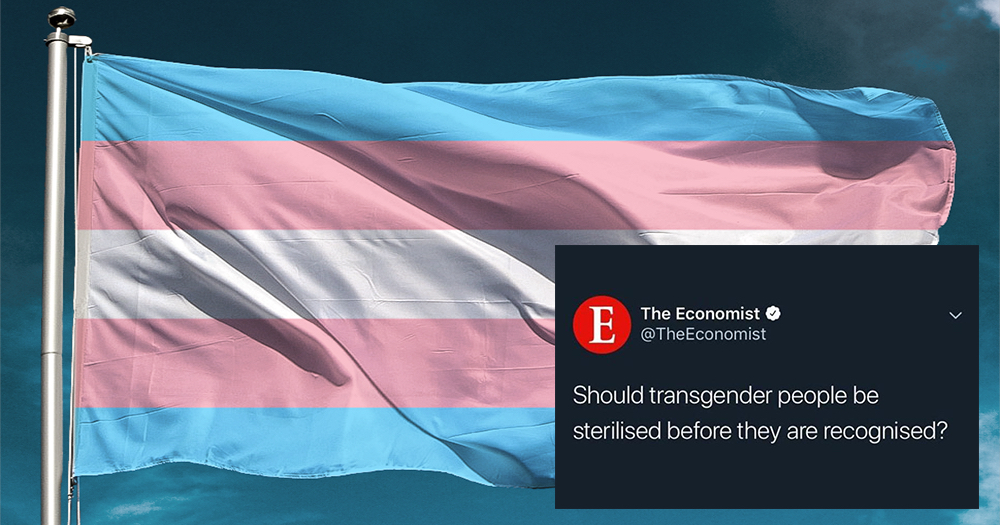It was the worst of tweets that, after some criticism, was subsequently deleted and replaced with a classic non-apology apology. The tweets came from The Economist, a weekly publication whose Twitter account has 23.6 million followers and whose bio reads ‘News and analysis with a global perspective.’
It’s a magazine you’ll have seen in your local newsagents and in airport kiosks around the world. Maybe you’ve even bought it or perhaps you subscribe to it. I’m not going to judge you for your taste in literature. I myself am a subscriber to that fine publication of decorum and good taste Rubber Nuns Monthly (this is possibly a joke, Ms Martin was unavailable for comment).
On Tuesday night, at 22:27 The Economist magazine’s Twitter account posted a tweet that asked ‘Should transgender people be sterilised before they are recognised?’ Nine words followed by a link to the article in question, an article about a Supreme Court case in Japan earlier this year which deemed that, yes, transgender people should be sterilised before they can achieve recognition.
We deleted an earlier tweet which mischaracterised our article on transgender rights in Japan. Here is that article, which remains unchanged https://t.co/prK4VoKHWJ
— The Economist (@TheEconomist) March 19, 2019
Most trans people will not be surprised by this. There are many countries around the world where this still occurs. Indeed, there are European countries where it still occurs. Thankfully, Ireland is not one of them.
In 2017 the European Court of Human Rights called for all 47 countries under its jurisdiction that once required sterilisation to no longer do so.
While it is perfectly legitimate for magazines like The Economist to highlight these stories and, indeed, write about them the problem lies in how they are framed.

The original tweet, for example, was framed as a question. It was pure clickbait given without any context whatsoever. It invites readers to react with a ‘yes’ or ‘no’ response. It holds trans bodies up for discussion and, yes, ridicule and oftentimes disgust. Just a quick look at the article in question and you’ll see phrases like ‘the unkindest cut’ and descriptions of the surgical procedures required for trans men.
Trans people, like everyone else, deserve dignity and bodily autonomy. Our bodies and our genitals should not be open to debate, public or otherwise. Our bodies are our own and we should not be required to modify them to identify as the people we are. Whether a trans person takes hormones or doesn’t take hormones, whether they decide to go down the surgical route or not go down the surgical route does not make them any more or any less trans. Our bodies should not be yours to discuss.

Tweets, like the one from The Economist, do not help.
In an era where trans people’s very existence, whether they should be allowed participate in sport or have access to changing rooms or bathrooms that match their gender identity is up for debate, it behooves the media to act responsibly towards such a sensitive and often complex subject.
And when, as happened with The Economist, you’re taken to task for being insensitive, you should listen and learn and not respond with a tweet saying that you ‘mischaracterised’ your article.
When their response did not quieten the critics as much as the magazine had hoped, they posted a follow-up tweet, finished off with a backhanded, unpunctuated “…Sorry”.
This is neither accurate, nor good enough. By deleting, reposting and deleting again it’s clear that you’re aware how seriously you’ve messed up. You pushed out a harmful and shockingly inaccurate narrative to encourage anti-trans debate. So when’s the proper apology coming?
— British LGBT Awards (@BritLGBTAwards) March 20, 2019
As non-apology apologies go, it was a doozy.
“We deleted an earlier tweet which mischaracterised our article on transgender rights in Japan. Here is that article, which remains unchanged.”
Not once was sincere regret expressed, not once did the publication show any degree of awareness of the issues facing the trans community today and the effect their ‘mischaracterisation’ may have.
Perhaps that was the unkindest cut of all.
© 2019 GCN (Gay Community News). All rights reserved.
Support GCN
GCN is a free, vital resource for Ireland’s LGBTQ+ community since 1988.
GCN is a trading name of National LGBT Federation CLG, a registered charity - Charity Number: 20034580.
GCN relies on the generous support of the community and allies to sustain the crucial work that we do. Producing GCN is costly, and, in an industry which has been hugely impacted by rising costs, we need your support to help sustain and grow this vital resource.
Supporting GCN for as little as €1.99 per month will help us continue our work as Ireland’s free, independent LGBTQ+ media.

comments. Please sign in to comment.